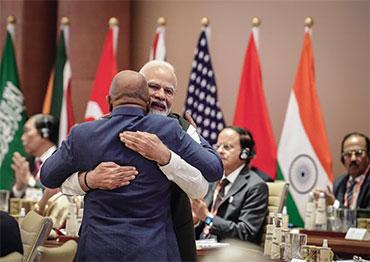Founded in 1999 following the Asian financial crisis in 1997 and 1998, the G20 initially served as a forum for financial ministers and central bank governors of major economies to discuss global economic and financial issues.
After the Lehman Brothers bankruptcy ignited the global financial crisis in 2008, the mechanism was upgraded to a leaders’ level summit as the crisis laid bare the insufficiency of the G8 of industrialized economies, given its relative decline in contrast to the rise of emerging economies, symbolized by BRICS countries (Brazil, Russia, India, China and South Africa).
In November 2008, leaders of G20 members, composed of 19 countries and the European Union, gathered for the first time in Washington, DC. Its response to the 2008 global financial meltdown is often lauded as an exemplary collaborative global crisis response.
When the third G20 Summit was held in Pittsburgh in 2009, US president Barack Obama announced that the G20 would replace the G8, designating it as the “premier forum for international economic cooperation.” The G8 was said to be taking a back seat in global governance in the future, with the G20 serving as the platform of a “new world order.”
But in reality, the G20’s central role has never truly materialized with the return of geopolitics and great power rivalry in the 2010s. Under the administration of former US president Donald Trump, the US adopted a unilateralist approach to global affairs and launched a trade war against China, kicking off de-globalization trends that threaten the fundamental principles of the G20.
During the Covid-19 pandemic, the G20’s response was criticized as slow and fragmented as the West refused to waive patent rights to Covid vaccines and was slow to share its vaccine supply.
Under the administration of President Joe Biden, the US doubled down on its anti-China strategy by reinforcing its alliance system. Unlike Trump, who described the G7 as an “outdated group of countries,” the Biden administration found new purpose in the G7– comprised of the US, UK, Canada, France, Germany, Italy, Japan and the EU, which regained its significance in US foreign policy, while the G20 is increasingly marginalized in US strategy.
With a more united position, the US-led West has been trying to dominate the agenda and push through political issues on the platform. This was most noticeable in the 2022 summit in Bali following the breakout of the Russia-Ukraine war.
Despite host Indonesia’s calls for unity and a focus on resolving global economic problems like inflation and food and energy security, it came under heavy pressure from the West to exclude Russia from the summit. Jakarta eventually chose to extend its invitation to both Ukrainian President Volodymyr Zelensky and Russian President Vladimir, though Putin decided not to attend. Zelensky spoke via video address.
This year, India did not invite Zelen-sky, and the joint declaration also adopted a neutral stance without directly criticizing or mentioning Russia regarding the war in Ukraine.
The summit also voted to admit the African Union, which includes 55 member states, as a permanent member of the G20. “Admission of the AU undoubtedly enhances the representativeness of the G20, better reflecting the voices and demands of developing countries and enabling the G20 to better respond to global crises,” Xu said.
But given the divisions between the West and the developing world over issues such as the weaponization of US dollars, it has become clear that the G20 cannot deliver a “new world order” as it was once hoped. Many developing countries looked elsewhere for cooperation. In August, governments across the Global South gathered in South Africa for a historic BRICS summit. The event announced the admission of six new members, including two G20 members, Argentina and Saudi Arabia, along with Iran, the United Arab Emirates, Egypt and Ethiopia.

 Old Version
Old Version


